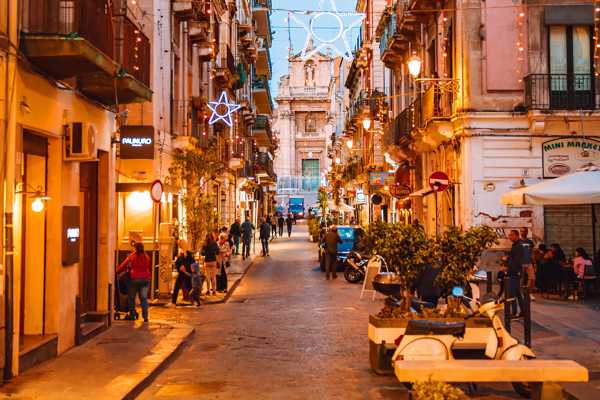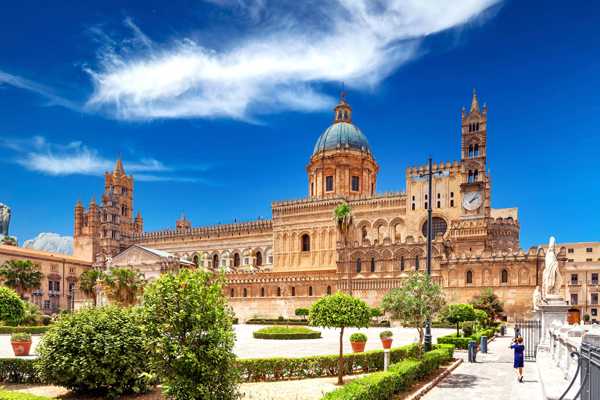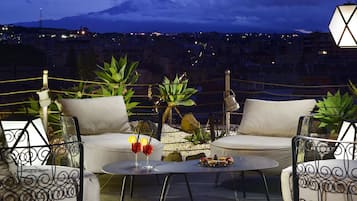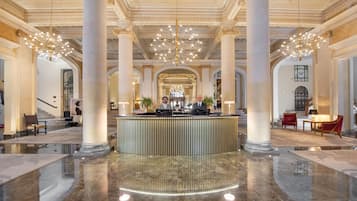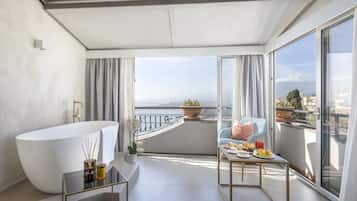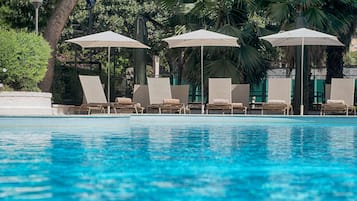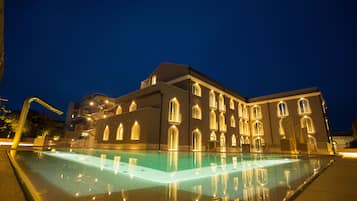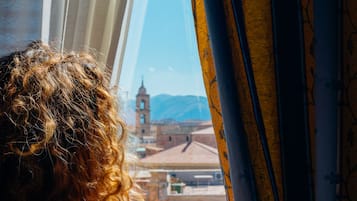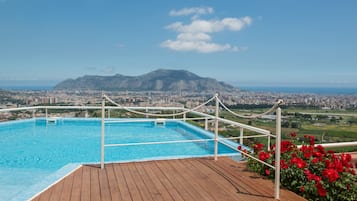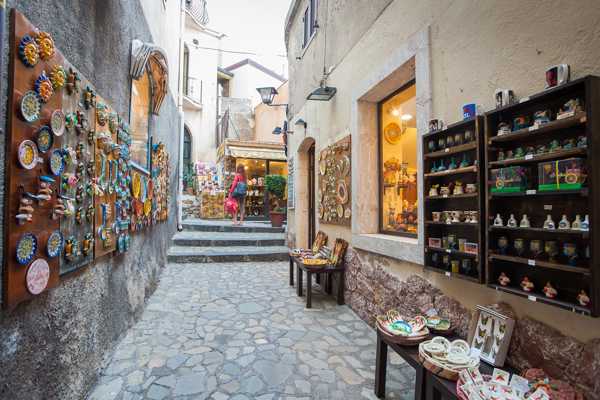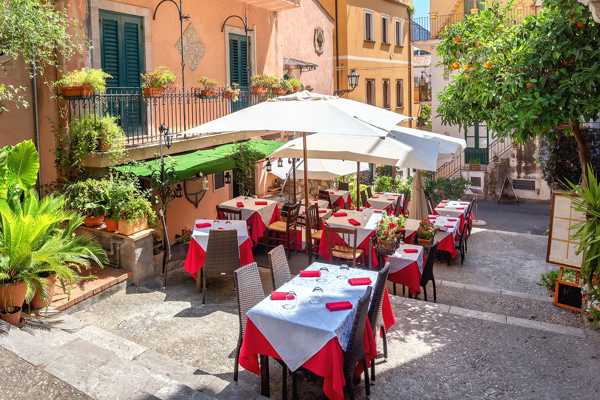Sicily’s charming towns and villages offer a rich experience of typical Sicilian life in the Mediterranean. As Italy’s largest island, it is steeped in a colourful history dating back thousands of years. With influences from Ancient Greece and Rome, the Byzantine era, Norman invasion, and its early Arabian settlers, Sicily is undoubtedly a fusion of cultural influences.
Slower paced than its mainland sister, this Mediterranean island plays host to many seaside retreats set beside sparkling blue waters, hilltop hamlets carved into rocky gorges, and unspoilt ancient ruins. To help you whittle down the vast array of choices, we’ve gathered together a list of Sicily’s most alluring towns and villages.
- 1
Slow down in Favignana
Find crystalline waters and private coves in the Egadi Islands

- Mạo hiểm
- Lịch sử
- Ảnh
Favignana is the largest of the 3 Egadi Islands, but often overlooked by travellers. You will discover a collection of unspoiled bays and grottos offering some of the clearest waters in Sicily. The deep, rocky waters of Scalo Cavallo, for example, will appeal to snorkellers looking to catch a glimpse of the local sea life. Further east, Cala Rossa is an excellent place to cool off after exploring the island. Biking is one of the best modes of transport to navigate the flat, eastern half of the island.
The main town of Favignana offers easy access to a sandy beach. Unlike most swimming holes on the island, there is a small port and the Fort of Santa Caterina to enjoy. It’s easy to soak up the relaxing atmosphere within the town’s pedestrianised streets and 2 piazzas filled with local trattorias
Bản đồẢnh của Giulia C. (CC BY-SA 2.0) đã điều chỉnh
- 2
Navigate the streets of idyllic Cefalu
Postcard-worthy laneways and squares lie around every corner

- Lịch sử
- Ảnh
Cefalu is representative of the quintessential Sicilian seaside town. Narrow, cobblestone streets, colourful facades, and washing strung from balconies are all common sights during your holiday. You can delve into some of the city’s history at Lavatoio, the medieval washhouse said to be the residence of the Norman King, Roger II, or admire Byzantine mosaic interiors within the Norman cathedral.
Heading down to the seafront, you’ll discover sandy stretches of beach and a small port filled with little fishing boats and fishermen tending to their nets. For views over the town and its surroundings, an ascent of La Rocca is challenging, but worth the reward of spectacular vistas.
Bản đồ - 3
Experience typical Sicilian life in Gangi
Visit “the most beautiful town in Italy”

- Lịch sử
- Ảnh
The town of Gangi charms travellers with its stunning green hills and brilliant view of Mt Etna. The medieval history of the village is visible in the winding streets and city walls that wrap around piazzas and squares. Entering the narrow streets, you’ll quickly discover the Tower of Ventimiglia, once belonging to one of the noble medieval families of Gangi.
The stone streets are also home to 2 palaces – Sgadari Palace and Buongiorno Palace. The former houses several museums, including the Archaeological Museum, the Gianbecchina Art Gallery, the Museum of Weapons, and the Ethno-anthropological Museum. Continue to the top of the town for the castle that was once residence to the Ventimiglia Lords and enjoy the views over the village crowned the most beautiful in Italy.
Bản đồẢnh của trolvag (CC BY-SA 3.0) đã điều chỉnh
- 4
Take a trip back in time at Montalbano Elicona
Where Catalan architecture meets Renaissance style

- Lịch sử
- Ảnh
Begin your exploration of Montalbano Elicona’s architectural fusion at this Swabian-Aragonese castle which was originally built as a fortress to overlook the city. Continuing with the tour of royal residences, make your way to the Royal Chapel, which dates back to the Byzantine period. It has 2 museums – one is devoted to early weapons known as the 'White Arms', while the other showcases musical instruments of the Middle Ages.
In the streets surrounding the castle, you will find the Church of St. Catherine, an interesting contrast of architectural influences. Catalan elements are blended with Renaissance-style decorations on a Romanesque facade for a truly intriguing combination.
Bản đồẢnh của Bdsklo (CC BY-SA 3.0) đã điều chỉnh
- 5
Discover the hilltop village of Castiglione di Sicilia
Visit a village perched on the hillside of the volcanic Mt Etna

- Lịch sử
- Ảnh
Castiglione di Sicilia is characteristic of a hilltop village, situated in a valley between Randazzo and the busy tourist port of Taormina. Among the houses perched along the hillside lies Piazza Lauria, which is paved with beautiful volcanic rock. Just moments away, you’ll find the 17th-century Church of Sant’Antonio. Continue towards the centre of town to explore Basilica Madonna della Catena, one of the village’s most important monuments.
As you move away from Castiglione di Sicilia’s centre, you’ll discover the U Cannizzu, known locally as the ‘Citadella’. The tower was believed to be part of a wider fortification that protected the city.
Bản đồẢnh của Kondephy (CC BY-SA 4.0) đã điều chỉnh
- 6
Walk the Lungomare on Ortigia
Stop off at Syracuse’s charming sister island

- Ẩm thực
- Lịch sử
- Ảnh
Ortigia is the beating heart of Syracuse, and nowhere quite captures the essence of Sicily like this charming island. Labyrinthe lanes skirted with lovingly worn facades conjure a certain romanticism for visitors. With a history soaked in ancient Greek and Corinthian heritage, it won’t be long before you find yourself at landmark attractions such as the Temple of Apollo and Piazza of Archimede. To the west lies the beautiful pedestrian square, Piazza del Duomo – the centrepiece of Ortigia.
You can walk around the small island – only 1 km long by 500 metres wide – as you enjoy the city’s seafront promenade. The best time to do this is either early morning or in the evening when you can catch the best light. Once you’ve completed your tour of Ortigia’s exterior, return inland to taste the delicious local offerings of cheese, meats, vegetables, and seafood at the daily market near the bridge that connects this historical epicentre to the Syracuse mainland.
Bản đồẢnh của Alfonso Messina Siracusa (CC BY-SA 4.0) đã điều chỉnh
- 7
Bask in the glow of Noto at sunset
Admire the city that is a pinnacle of Baroque architecture

- Lịch sử
- Ảnh
Noto was completely restored after the original town was destroyed by an earthquake in the late 17th century. It's also built in parallel lines with roads running east to west to take advantage of the sun. The limestone buildings absorb sunlight, casting everything awash in golden honey shades at sunset.
You can see the height of Baroque architecture while sightseeing in Noto. Corso Vittorio Emanuele is home to many of the town’s most impressive structures including Monastero del Santissimo Salvatore, Jesuit Church, Palazzo Nicolaci di Villadorata, and Palazzo Ducezio. In May, Via Nicolaci is transformed for the Infiorata festival with a carpet of petal mosaics adorning the street.
Bản đồ - 8
Explore Sicily’s deep south in Marzamemi
Learn about the importance of the history of the islands first tonnara

- Lịch sử
- Ảnh
The fishing village of Marzamemi is known for its brightly painted doors and small stone-block buildings, which are ingrained by the Arabs during the 10th and 11th centuries. Earning its place in Sicilian history, the village is still well-regarded for having some of the best tuna in the region. Its roots lie in the establishment of Sicily’s first tonnara (tuna factory), which is no longer operational but often used for private events.
Offshore, Marzamemi holds secrets beneath the sea with ancient Roman shipwrecks lying under the waves. Ruins of an early Byzantine Church have also become part of an excavation project since a local fisherman discovered the wrecks in the late 1950s.
Bản đồẢnh của Enrico Strocchi (CC BY-SA 2.0) đã điều chỉnh
- 9
Wander UNESCO-listed Ragusa
Get lost among a jumble of houses and churches

- Lịch sử
- Ảnh
Ragusa Superiore’s streets are organised in a grid network located on a plateau above Ragusa Ibla, the Old Town. A jumble of houses and churches cling to the sloping gorge, deceptively confusing from a distance, it quickly reveals its Baroque logic as you enter the town’s centre.
It’s the lower town, Ragusa Ibla– built on the site of the original before it was destroyed in a late 17th-century earthquake – that truly enchants visitors. Atop some 200 steps, you can admire the neoclassical dome of Basilica di San Giorgio before taking in some of the most impressive views of the town from the public gardens of Giardino Ibleo.
Bản đồẢnh của Andrea Schaffer (CC BY 2.0) đã điều chỉnh
- 10
Unearth Greek archaeological sites in Agrigento
Schedule a visit to the ancient city of Akragas in the Valley of the Temples

- Lịch sử
- Ảnh
One of the oldest towns in Sicily, Agrigento is the site of many ancient ruins. Upon first inspection, it might lack the traditional charm of towns and villages nearby, due to modern apartments and nearby motorways. But once you make your way into the Old Town, you'll be surrounded by impressive architecture. Visit the oldest district, Chiesa di Santa Maria dei Greci, and you'll find a small courtyard with its interiors featuring 14th-century frescos.
At the apex of Agrigento though is the Valley of the Temples. This UNESCO World Heritage site stands as a great testament to Greek culture and art. The Temple of Concordia, which retains all the columns of its original structure, is considered one of the best-preserved Doric temples in the world.
Bản đồ


